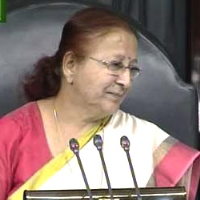Govt Fails to Support Institutions by Denying Congress the Leader of Opposition
 Sumitra Mahajan, Speaker of the Lok Sabha (photo grab: Lok Sabha TV)
Sumitra Mahajan, Speaker of the Lok Sabha (photo grab: Lok Sabha TV)
The Modi administration seems to be following the letter of the rulebook when it comes to the appointment of a Leader of the Opposition. The Congress has a mere 44 seats in the Lok Sabha – less than the 55 seats (10 percent of the total) required – so Speaker Sumitra Mahajan rejected on Tuesday the Congress’ demand for the post of Leader of Opposition.
"I have gone by rules and tradition," Mahajan told PTI. She is also believed to have cited the precedents in 1980 and 1984 when there was no recognised Leader of the Opposition in the Lok Sabha.
But the NDA administration should also follow the spirit of the rules, which demands that there be a Leader of the Opposition. So what if the Congress is short of the magic 10 per cent? As a group the UPA meets the criterion with its 55 seats.
The administration should not be petty about allowing this. After all, the UPA ruled for 10 years so surely the political alliance can be recognised as an entity when it comes to the Leader of the Opposition. What matters is whether there should be political will in the NDA to be magnanimous to its defeated rival, and not 'defang' it so much that the institutions of democracy are irrevocably damaged.
This is not just a question of being humble in victory. Allowing a Congress leader to become the Leader of the Opposition will help grow that institution and support the functioning of the Lok Sabha itself.
The Leader of the Opposition in both the Houses of Parliament enjoys the status of a cabinet minister. He or she also plays a role in selecting important government appointees, such as the central information commissioner and the central vigilance commissioner, who are recommended to the President by a three-member committee consisting home minister and the Leader of Opposition in the Lok Sabha.
There are media reports that the government may change the laws that require the Leader of the Opposition to be a member of such committees. If the government is ready to change these laws, then surely it could have modified the 10 percent law to accommodate the Congress.
Meanwhile, the party reacted sharply to the Speaker's decision, calling it "unfair and blatantly partisan".
"Any convention and Speakers' directive cannot subordinate the law," said Congress spokesman Anand Sharma. He told PTI that the Speaker's decision proves the NDA administration is going to "undermine" every institution, including Parliament.
The atmosphere of confrontation could become entrenched in this Parliament as well. Given the tough response that the government’s proposed amendments to the insurance bill received in the Opposition-dominated Rajya Sabha, the NDA administration would have found a Leader of the Opposition useful to resolve the political standoff. It should be careful what it wishes for.
- Top Stories
- Controversies
- Where is the Money Going?
- India and the World
- Appointments and Resignations
- Unusual News
- Latest News
- India College Chain’s Expansion into U.S. Draws Opposition from Massachusetts Officials over Quality of Education
- Milk Shortages in India Tied to Release of New Movies Featuring Nation’s Favorite Stars
- Confusion Swirls around Kashmir Newspaper Ban in Wake of Violent Street Protests
- Polio-Free for 5 Years, India Launches Vaccine Drive after Polio Strain Discovery
- New Aviation Policy Could Increase Service, Lower Ticket Prices






Comments